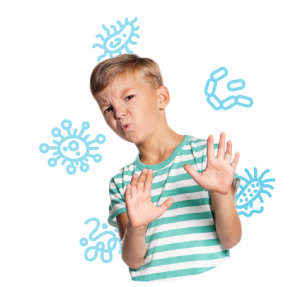The 5 Easiest Ways to Avoid Contagious Colds, Flus and Bugs
There are many things you can do to help keep the germs that cause colds, flus and other bugs at bay.
Germs are tiny living organisms that can cause disease in people, plants and animals. Unfortunately, germs are everywhere! We come into contact with germs every day, and most of the time, our immune systems keep us safe. But there’s no warning bell when a particularly nasty germ is lurking nearby or when your immune system is feeling low. And during cold and flu season, the nastiest of germs are likely in the air or hiding on many things you need to touch, like door handles, light switches, and even your loved ones’ hands.
The good news is there are many things you can do to help keep the germs that cause colds, flus and other bugs at bay. Here are 5 of the easiest and most effective.
1. Keep those hands washed!
Notice we didn’t say “wash your hands”? For all parents, big brothers, and big sisters, it is important to encourage younger children to wash their hands, too. Hand washing is so important to stop the spread of disease, it’s right at the top of the CDC’s list of ways to keep yourself from getting sick.
In fact, we believe in the importance of hand washing so much that we have created an awareness campaign using our own ExperBEAR to champion the cause. ExperBEAR, along with ExperCARE providers, periodically visits schools in our area to teach kids about hand washing and its importance.
Running your hands under some water for a few seconds won’t do the trick. Here’s how to make hand washing your best defense against germs:
Wet your hands with clean water.
Then turn off the water, and generously apply soap.
Rub your hands together to lather the soap.
Make sure you get the front, back, in-between fingers, and even under the nails.
Continue for a minimum of 20 seconds.
Tell the little ones to sing the Happy Birthday song twice to keep track of time, or practice the ABC song.
Rinse and dry your hands.
Use a clean towel or let them air dry.
Hand sanitizer is good in a pinch.
However, it isn’t nearly as good as a proper washing. Germs can hide under dirt or other substances on your hands, and some germs are resistant to sanitizers.
2. Keep it clean!
To get an understanding of why it’s so vitally important to keep things clean, including your hands, learn a little about how germs work.
• Flus and colds are spread by viruses (a type of germ). When people cough, sneeze, or touch their mouths, they can transfer those viruses to the air and things you have to touch.
• Flus viruses can survive on hands and other surfaces up to 24 hours.
Cold viruses can survive on hands for 6 hours, and up to 7 days on hard surfaces!
So keep all surfaces that are touched often as clean as possible. Give cell phones, door knobs, light switches, countertops, keyboards and other high-touch areas extra TLC.
3. Keep hands away from the eyes, nose and mouth.
Your eyes, nose and mouth have mucus membranes. These membranes protect parts of your body that are open to the air.
Whenever you touch these areas, you disrupt the protection from mucous membranes. Think of it like opening the door to germs and carrying them inside your home! You may think that touching one’s face is really only a problem for kids, but think again.
People subconsciously touch their face 2-5 times per minute—that’s up to 3,000 times per day! [source]
4. Cover your cough!
It should go without saying, but we see people sneeze and cough freely all the time. Salad bars have sneeze guards for a reason after all. If you’re sick, carry plenty of tissues to cough or sneeze into. If you’re caught off guard, use the inside of your elbow. Don’t forget to wash your hands after!
5. If it touches a mouth, nose or eyes, it’s not for sharing in cold and flu season.
Consider the face the highway to getting sick. So avoid sharing food, utensils, handkerchiefs, lip balm, eye drops, and anything else that touches mucous membranes.
You may think that if you and another both feel fine, that it’s safe to share, but think again. People often carry and spread germs around without feeling sick themselves.







